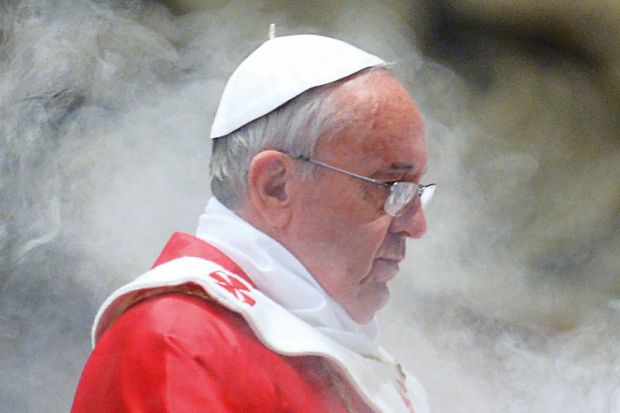When Pope Francis issued his so-called green encyclical, he did not merely offer moral backing for the argument that climate change is man-made. The Pontiff also put new pressure on universities worldwide to help do something about it.
Activists and experts say that the Pope’s message offers new momentum for efforts to compel higher education institutions to divest their holdings in fossil fuel companies – especially the US’ 250 Roman Catholic universities and colleges.
Already, the board of directors of Georgetown University in Washington DC – a city the Pope is due to visit in September – has voted to end its direct investment in companies mining coal. The university has a $1.5 billion (£1 billion) endowment. It joins about 30 other US institutions that have agreed to divest from fossil fuel companies to one degree or another, including the universities of Stanford, Syracuse, Maine, Hawaii and Washington.
Most of the institutions that have promised to divest from fossil fuel companies are relatively small, however, and Georgetown aside, only one is Catholic: the University of Dayton, which joined the movement last year, citing its religious values.
Several other Catholic universities have previously said that they would not divest, contending that the purpose of their endowments was to support their educational missions, not political ones.
The Pope’s encyclical could change their stance, said Nancy Tuchman, a professor and founding director of the Institute of Environmental Sustainability at Loyola University Chicago.
“The Pope’s encyclical has given us a lot of leverage to really push this forward to the next step,” Professor Tuchman said. “It’s a watershed moment. There has been a little bit of movement on divestment from universities across the country, but what the Pope has done is call us to action. And not just Catholics, he’s speaking for all of humankind.”
What Catholic universities decide to do will likely have an influence on other institutions, she added. “The more universities that divest, the greater awareness is raised.”
Loyola has agreed to review its entire portfolio with an eye towards divesting from fossil fuel businesses and possibly other industries. While no final decision has been made, the president and provost have responded to student activists by saying that they support the idea of divestment.
The encyclical says that consumerism has helped to turn the planet into “an immense pile of filth”, with a disproportionate impact on the poor.
“We need to reject a magical conception of the market, which would suggest that the problems can be solved simply by an increase in the profits of companies or individuals,” the encyclical says.
At a time when they have been frustrated by half-hearted support from some of the nation’s political leaders, and downright opposition from others, US fossil fuel divestment activists have gleefully welcomed the Pope’s decree.
“By putting the climate crisis in spiritual and moral terms, Pope Francis has focused a spotlight on the ethical and economic shift we urgently need,” said May Boeve, executive director of the climate campaign group 350.org. The group takes its name from the “safe” 350 parts per million limit for atmospheric carbon dioxide.
In higher education, there remains robust debate about whether divestment is the right response to the challenge of climate change, or if holding on to their investments gives institutions greater leverage to effect change. It is a debate that has also gained a lot of traction in the UK, where a growing number of universities have chosen to divest in some form.
Supporters of divestment say that, among other things, it gives universities a chance to demonstrate moral leadership.
Opponents of divestment worry about setting a precedent – the student senate at Loyola, for example, also wants the university to divest from companies that do business with Israel – and note that rooting out fossil fuel firms from complex investment portfolios could disrupt endowment returns.
Professor Tuchman said that divestment has symbolic value.
“It has a lot more impact on the symbolic side or the stigma side than it has really on hurting these fossil fuel companies financially,” she said. “It’s about raising awareness, about saying we’ve got to start somewhere, and what these institutions have to work with is the money they’re investing.”
POSTSCRIPT:
Article originally published as: Pressure builds on Catholic cohort to join ‘green converts’ (9 July 2015)
Register to continue
Why register?
- Registration is free and only takes a moment
- Once registered, you can read 3 articles a month
- Sign up for our newsletter
Subscribe
Or subscribe for unlimited access to:
- Unlimited access to news, views, insights & reviews
- Digital editions
- Digital access to THE’s university and college rankings analysis
Already registered or a current subscriber? Login




